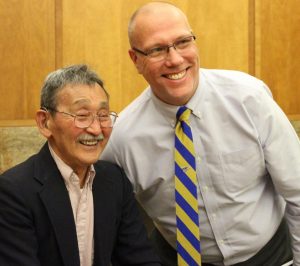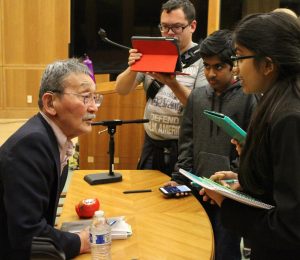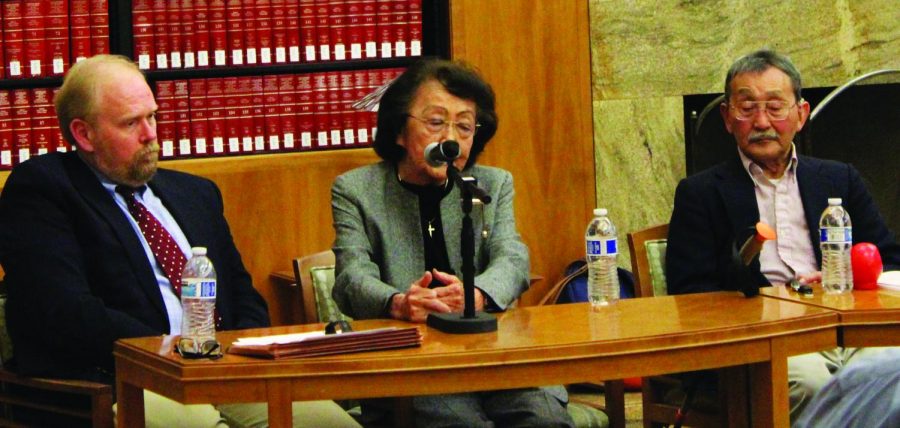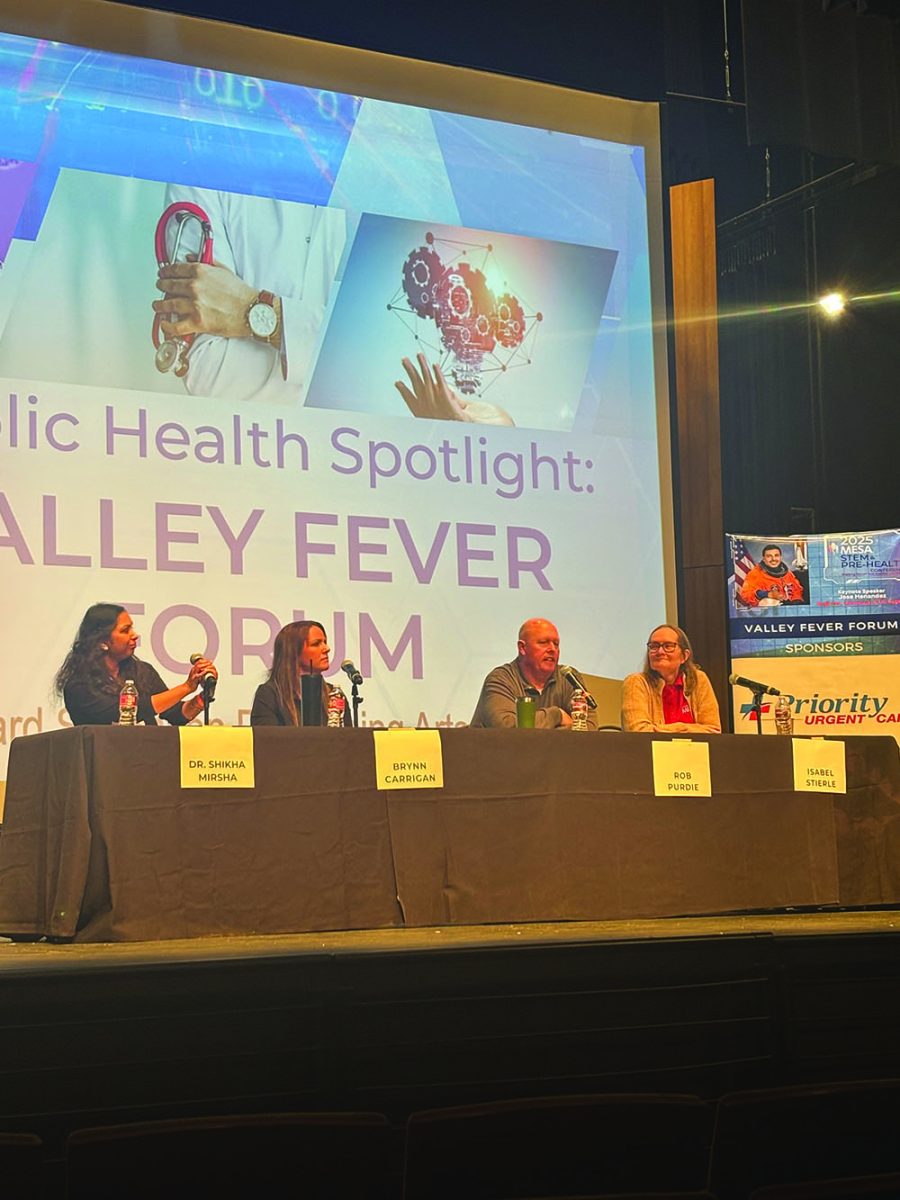Japanese speakers talk about their lives in internment camps during WWII
Dr. Douglas Dodd, Mary Higashi and Dr. Fijimoto discuss and answer questions about the Japanese Internment event that was held in the CSUB library Tuesday night
February 11, 2018
Two Japanese speakers addressed a crowd at CSUB on Jan. 30 to deliver a speech about how their lives were changed during World War II in the Japanese internment camps.
Before the speakers began their speeches, a movie was played. The film was about the story of Ralph Lazo; a Mexican American teenager who voluntarily went inside an internment camp so he could be with his friends. The film lasted a little over 30 minutes.
The first Japanese speaker, Mary Higashi, spoke to the audience about her family’s life story and she shared with the audience how she felt during the Japanese internment camps. She gave a PowerPoint presentation in order to explain what her life was like.
“My father came to America in 1914. He came on a student visa when he was 17 years old at the request of his father who came to America in 1908. They lived in Bakersfield,” said Higashi.
When she was born she attended schools in Bakersfield including Kern County Junior High School which is now called Bakersfield High School. She also attended Bakersfield College. During her presentation she also shared about the experience her father endured, who was taken to the internment camp by the FBI.
“My father was taken by the FBI and he was gone for a year and this picture was taken after his return,” explained Higashi.
Higashi told the audience that when Pearl Harbor was attacked she, like many other children, was at church. Later on the day she was told that Japan had attacked America and felt scared of what would happened to her parents.
Before the attack on Pearl Harbor took place Higashi’s father wanted to become a U.S citizen, but citizenship was not available to him until the 1950’s. In the 1950’s he became the first Japanese person to become a citizen in Bakersfield.

Higashi also talked about a man that she met in the camp where she was and that he courted her for about three years, but she had told him that she was not sure if she could marry him because his father could be sent back to Japan. Eventually, they were on May 1945 inside the internment camp. Higashi was able to forgive the government for its part in sending Japanese people to internment camps.
“I forgave the government and was able to live with myself. I have lived a happy life. If I had that hostility in me [I] would not have been able to; I feel I have been blessed because of my attitude,” she said.
The Junior College (which is now Bakersfield College) gave an opportunity to the Japanese people who had been in an internment camps to graduate from a college. Among those who graduated Junior College was Higashi. She was a sophomore and was about to graduate from Kern County High School (now Bakersfield High School) in 10 days when she was taken to the camps along with her family.
“When the evacuation happened I was so disappointed that I didn’t get to participate in the actual ceremony,” she stated emembering when she was taken to the internment camps.
After Higashi’s interview concluded the second Japanese speaker began to tell his story by letting the audience know of some important information that can improve someone’s life. Dr. Isao Fujimoto talked about the different methods that have helped people live their lives to their fullest potential.
“I want to talk about resilience because there is a saying in Japanese that if you fall seven times but on the eight-time you stand up and stay up, and that is a picture of resilience,” said Fujimoto.
The second topic he mentioned was about community and he feels they are essential because you get the help from other people to get things done in life.
“Community means people working together to get together and get the job done,” he said, “I believe that community and resilience are very important terms to keep on moving. “added Fujimoto
After stating in what w

Dr. Fijimoto talks to a group of middle schoolers from a local Bakersfield middle school and answers their questions about his experience in an internment camp
ay community and resilience helps a person, he said that having spiritual bearings can help others understand the pain in someone’s life.
“My mom grew up in Buddhism; she told me a little bit about the foundation and she told me about the Four Noble Truths,” said Fujimoto, and he added “the Four Noble Truths say suffering is part of life we need to understand the cause of pain and suffering.”
Jose Tonorio, a CSUB student, felt really happy that he had the opportunity to go to this event where he was able to learn more about the internment camps.
“Some new information I heard was when they were transporting the Japanese people on the trains, and they did not know where they were going,” said Tonorio.
He also learned that Japanese people had the opportunity to fight during the war because a draft took place almost right after the concentration camps were introduced. He also enjoyed the speeches that Fujimoto Higashi gave at the event.
“I really liked what Dr. Fujimoto said ‘if you get knocked down seven times you stand up on the eight and you stay up.’”
Alanna James, a Bakersfield College student, also attended the event as well and was astonished by what she saw. “The photos that Higashi shared were phenomenal. I liked how she was able to share all about her family and we were able to witness it as well,” James said.
What really surprised her most was the sideshow were Fujimoto and Hagashi managed to deliver informative speeches. She concluded by saying that she would gladly attend future events at CSUB.






